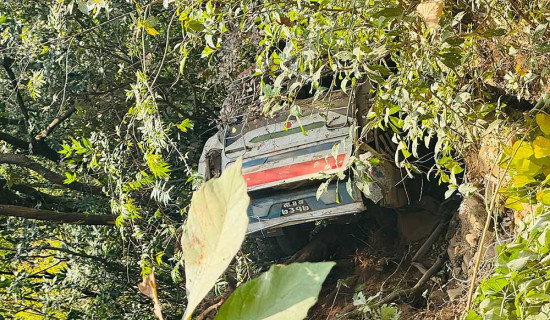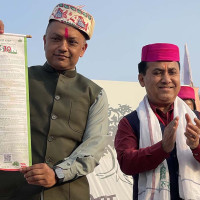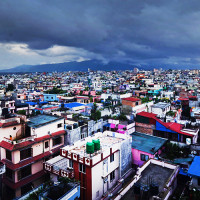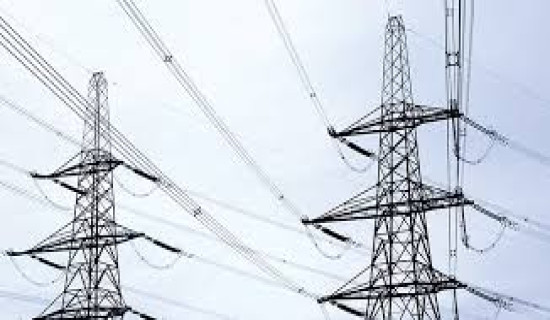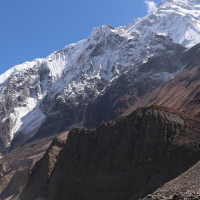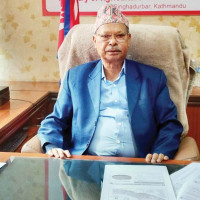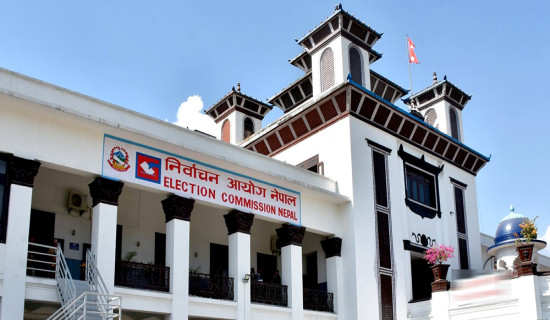- Thursday, 19 February 2026
Stem Deterioration Of School Education
School teachers have hit the streets of Kathmandu to put pressure on the government to meet their demands by enacting the long-stalemated school education law. The teachers have also accused the government of turning a deaf ear to addressing several issues that had been agreed upon and pledged for implementation time and again in the past. It is to be noted that school teachers had launched similar protests in the past to compel the government to meet their demands, but halted following the agreements with the state authority. This time, the school teachers look more adamant and determined to compel the government to meet their demands. The teachers have already held talks with the key representatives of the state authorities, including the Prime Minister and the Speaker of the House of the Representatives, among others.
However, it is yet to be seen whether the exhortation made by the Prime Minister, ministers, and the party leaders will be able to persuade the teachers to end their protest. Some section of the civil society has been critical of the ongoing protests of the teachers, alleging that the act of disobedience launched by the teachers was an ill-timed and unsuited move having adverse effects on the several aspects including the SEE results, student enrolment and so on for the new academic session and many other issues. Nepal Association of Guardians (Nepal Abhibhabak Sangh) has raised concerns over the teachers' agitation as it has hurt the right to education of the children.
Lack of prudence
A highly esteemed and widely read magazine long specialising in educational issues, “Shikshak monthly", in its editorial comment, points fingers at the government, pointing out that the lack of prudence, clarity, and foresight was responsible for the current chaos in the school education. The government agreed in the past to meet all and sundry demands raised by the teachers, which exceeded the limits of the constitutional boundaries. The demands like diluting the mandate and competency of the local government, which is entrenched as the exclusive function of the local bodies, would not be met without amending the constitution.
Moreover, at a time when the revenue shortage has become an emergent issue, several demands put forth by the teachers seek to raise their perks and remunerations that would have budgetary implications as well. Moreover, it is also alleged that the political parties are responsible for unionising and politicising teachers and using them as if they were the party functionaries. This has allegedly made teachers less committed and accountable to the schools, which is indicated by the declining learning outcomes at the school level. Needless to say, education is a public good for which the role of the state is very crucial to ensure that quality education is provided to the students, irrespective of their social and economic background.
Several reasons are attributed to the deterioration of the standard of school education. To halt this deterioration, educationists argue that over twenty per cent of the total national budget should be allocated for quality school infrastructure development. Others contend that the school supervisory system needs to be strengthened to ensure that teachers’ delivery in the classroom is appropriate and effective. Another hitch that has been noticed is that the qualified and educationally competent candidates do not prefer to join teaching as an enduring and settled profession.
According to a report, the National Teacher Service Commission, which is legally mandated to oversee and conduct examinations for the selection and recruitment of teachers, has not been able to receive the required number of qualified applicants for different categories of disciplines, such as mathematics and science. Two reasons, according to the experts, can be cited in this respect. Either qualified candidates are insufficient, or not much attraction or incentive exists to attract them to join teaching as an occupation among the qualified candidates.
Today, it is found that teachers in the community schools, irrespective of the levels, send their children to private schools, indicating that they have no confidence in the teaching learning environment in the schools where they are paid for and employed in the privileged and respectable position of teachers and educators. When the teachers who need to own and be accountable for the teaching and learning outcomes in the school have lost their trust in the learning effectiveness in the schools they are associated with, it is almost futile to expect improved and quality learning environments in the public schools. In Nepal, during the early Seventies, the government made a national policy of making education a subject of national government obligation.
Private schools
Though the reach and expansion of the schools was limited and confined to some convenient locations in the district in those days, education imparted to children in the public schools was uniform, where students from haves and have-nots communities attended and received education. When the education sector was liberalised and opened for private sector participation, especially during the late 1980s through amendment to the Education Act and Rules, it unleashed an unregulated mushrooming growth of the private schools, both in the urban, semi-urban, and even in the rural areas of the country.
The private schools slowly captured the education landscape. As a consequence, the social and political elites started to disown and discard public school education on various counts. First, elites and well-off communities let down and withdrew from the public schools, leaving them to fend for themselves by sending their children to private schools. Against this backdrop of sharp deterioration of the school education quality, the new education law, as demanded by the agitating teachers and formulated by the government, should focus on enshrining provisions that would elevate the standards of school education.
(The author is presently associated with the Policy Research Institute (PRI) as a senior research fellow. rijalmukti@gmail.com)



